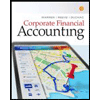Sales of $ 183,000 $ 158,000 on account $ 25,000for cash Ignore Cost of Goods SoldCollections on account $ 124,000Write-offs of uncollectible receivables $ 2,500post mountaintop,s transaction to the accounts receivable and allowance for bad debts t accountenter the beginning balances and the journal entries, and then computer the unadjusted balance of each account
Sales of $ 183,000 $ 158,000 on account $ 25,000for cash Ignore Cost of Goods SoldCollections on account $ 124,000Write-offs of uncollectible receivables $ 2,500post mountaintop,s transaction to the accounts receivable and allowance for bad debts t accountenter the beginning balances and the journal entries, and then computer the unadjusted balance of each account
Chapter4: The Adjustment Process
Section: Chapter Questions
Problem 2PB: To demonstrate the difference between cash account activity and accrual basis profits (net income),...
Related questions
Topic Video
Question
Sales of $ 183,000 $ 158,000 on account $ 25,000
for cash Ignore Cost of Goods Sold
Collections on account $ 124,000
Write-offs of uncollectible receivables $ 2,500
post mountaintop,s transaction to the
enter the beginning balances and the
Expert Solution
This question has been solved!
Explore an expertly crafted, step-by-step solution for a thorough understanding of key concepts.
This is a popular solution!
Trending now
This is a popular solution!
Step by step
Solved in 3 steps

Knowledge Booster
Learn more about
Need a deep-dive on the concept behind this application? Look no further. Learn more about this topic, accounting and related others by exploring similar questions and additional content below.Recommended textbooks for you

Principles of Accounting Volume 1
Accounting
ISBN:
9781947172685
Author:
OpenStax
Publisher:
OpenStax College

Cornerstones of Financial Accounting
Accounting
ISBN:
9781337690881
Author:
Jay Rich, Jeff Jones
Publisher:
Cengage Learning

Managerial Accounting
Accounting
ISBN:
9781337912020
Author:
Carl Warren, Ph.d. Cma William B. Tayler
Publisher:
South-Western College Pub

Principles of Accounting Volume 1
Accounting
ISBN:
9781947172685
Author:
OpenStax
Publisher:
OpenStax College

Cornerstones of Financial Accounting
Accounting
ISBN:
9781337690881
Author:
Jay Rich, Jeff Jones
Publisher:
Cengage Learning

Managerial Accounting
Accounting
ISBN:
9781337912020
Author:
Carl Warren, Ph.d. Cma William B. Tayler
Publisher:
South-Western College Pub


Corporate Financial Accounting
Accounting
ISBN:
9781305653535
Author:
Carl Warren, James M. Reeve, Jonathan Duchac
Publisher:
Cengage Learning

College Accounting (Book Only): A Career Approach
Accounting
ISBN:
9781337280570
Author:
Scott, Cathy J.
Publisher:
South-Western College Pub